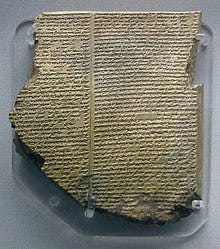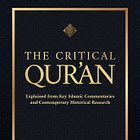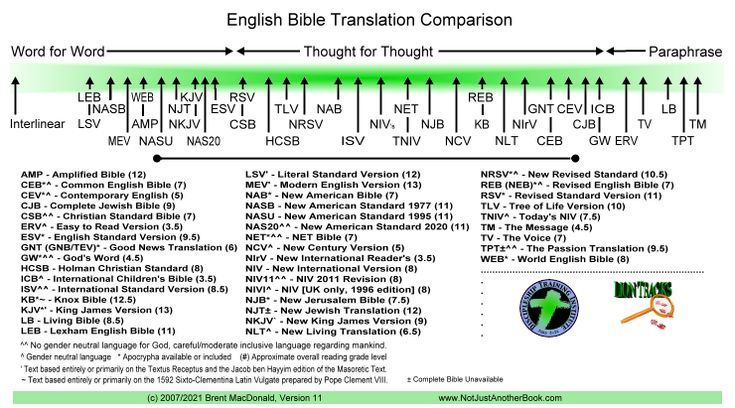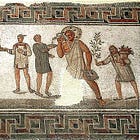10 Things Everyone Should Know About the Bible
Because it is the most influential book ever written, after all
One of my earliest posts on this blog was a list of ten things everyone should know about the Quran, Islam's holy book. I enjoyed writing that post and was quite pleased with the end result, so I thought it would be cool to write a post like that one about the Bible instead. This one was a bit harder to put together than that one because the Bible is significantly longer and more diverse than the Quran, so I wanted to avoid making broad generalizations as much as possible. Anyway, this list is in no particular order and I hope you learn something from it!
1. It is composed of many different genres
This is a very well-known fact but I thought it was still worth including as knowing it is absolutely essential to biblical interpretation. The Bible’s genres include historical narrative, poetry, apocalyptic literature, prophecy, building instructions, wisdom literature, parables, letters, genealogies, biography, and more. Some argue that certain biblical passages are entirely mythical, though whether or not this is the case is irrelevant to my point. Due to the wide variety of genres, one should not read everything in the Bible in the same way, as the intents of the biblical authors ranged significantly.
2. It was written by people who had an ancient understanding of the world
The Bible is indisputably an ancient book. Although the books of the Bible were written over the span of more than a thousand years and scholars debate the dating of certain books, they all originate from the ancient period. This means that the Bible was written by ancient people, and those ancient people had an ancient understanding of the world. As such, a careful student of the Bible should attempt to see the Bible the way an ancient person would, rather than a modern one.

Thus, doing something like reading modern science into the text is eisegesis, as things like that were not in the minds of the biblical authors when they wrote. I (and many other Christians) believe that God used the common cultural understandings that existed at the time the books of the Bible were being written to effectively communicate to the people alive at that time. As such, some things in the Bible sound very foreign or even inaccurate to modern readers, which is why studying the cultural contexts of the world of the Bible is a helpful thing to do.
3. There are plenty of textual variants and uncertain readings
Prior to the invention of the printing press by Johannes Guttenberg in 1440, all Bible manuscripts had to be copied by hand. As is the case when the same text gets copied over and over for several centuries, mistakes were made and things were added. The vast majority of textual variants in the biblical manuscripts are spelling differences or some other very minor errors that do not affect the meaning in any way.
However, some variants do change the meaning of the text. Some notable examples of this are the sons of Israel/sons of God in Deuteronomy 32:8, the height of Goliath in 1 Samuel 17:4, and the verse about the Trinity in 1 John 5:7. There are also two lengthy passages in the New Testament which are almost certainly not original; these are the longer ending of Mark in Mark 16:9-20 and the account of the woman caught in adultery in John 7:53-8:11.
Additionally, there are some ancient Hebrew words whose meaning is uncertain, leading to ambiguity in what the passage is trying to say. Most modern Bibles have footnotes that mention significant variants or other textual issues. These things, while interesting to study, do not undermine the truth claims of Christianity, as no major doctrine is changed or removed.
4. The canon was not decided by the Council of Nicaea and/or Emperor Constantine
Unfortunately, myths surrounding the Council of Nicaea and the canon of scripture still float around the internet despite there being no evidence for the claims made. The first council of Nicaea in 325 CE, also known as the first ecumenical council, had nothing to do with the canon of scripture, that is, which books should be in the Bible. Instead, it was mainly about the Arian controversy, as a dude named Arius had been going around saying that Jesus is a created being and did not exist eternally.
The recognition of which books were to be considered inspired scripture was a gradual process that was discussed and debated for the first few centuries of the church, and there are still disagreements between denominations to this day. However, the first recorded list that includes all the twenty-seven books of the New Testament and excludes all other potential NT books is the 39th festal letter of Athanasius of Alexandria, written in 367 CE, decades after the council of Nicaea had taken place. This list was not determined by any church council, rather, it came to be widely accepted over the next few decades.
5. There is no definitive best English translation
No translation of any text is perfect. While there are several very good English Bible translations, the intents of the translation committees vary depending on what they are trying to accomplish with their translation. Some translations opt for more of a word-for-word approach in which they attempt to translate as accurately and close to the original as possible. Translations of this sort can be a bit difficult to read as they often do not have the best English grammar but are meant for deeper study rather than casual reading. Other translations try to render the author’s meaning and intent in a thought-for-thought way rather than aiming to translate things literally. Ones like these are generally easier to read, as they simplify phrases to be more understandable to modern readers. Of course, many translations lie between these two approaches, as you can see in the image below.
There are those who like to assert that their preferred translation is the best, and this attitude is especially prevalent among those who use the King James Version, a phenomenon known as KJV-onlyism. I would discourage this belief, as the KJV, while an excellent translation at the time, has since become outdated both in the style of language it was written in and in the manuscripts it used, as more and more ancient Bible manuscripts have been discovered since then. While it is perfectly fine to have a go-to translation that you use more than any other, it is a good idea to look at a few different translations to get a better idea of what that particular passage is saying.
6. It uses a variety of literary devices and metaphorical language
The Bible, like nearly every written document, cannot be taken entirely literally. It contains a plethora of literary devices such as personification, metaphor, idioms, and hyperbole. Some of these are very obvious, such as the mountains singing and trees clapping their hands in Isaiah 55:12, though other uses of non-literal language in the Bible can be harder to recognize. I remember being quite uncomfortable to learn that the conquest accounts in the book of Joshua utilized hyperbolic language when discussing the extent to which the enemy was defeated, as this did not fit with the way I viewed the Bible at that time.
Part of correctly interpreting the Bible is being aware of these techniques and the way they are used. As the ancient Israelites had different idioms from the ones we use today, using commentaries can be helpful in understanding the meaning of confusing passages. So when someone tells you that they read the Bible literally, maybe ask them if Jesus was literally a vine (John 15:1).
7. Slavery is not promoted
One thing that certain internet atheists, or other critics of Christianity, like to bring up is the issue of slavery in the Bible. They claim that because the Bible contains instructions surrounding the ownership of slaves in both Old and New Testaments, the Bible therefore condones slavery. This is a complex issue that I can only begin to touch on here, but I believe that the Bible, in fact, discourages the practice of slavery. We know from other sources that slavery was ubiquitous across the ancient world and the abolition of it would have been unthinkable. Therefore, God chose to institute rules and restrictions surrounding slavery in the Old Testament law rather than condemning it outright, though it has been noted that ancient Israelite slavery was more humane than the way it was practiced in other places in the ancient Near East.
In the New Testament, slavery is mentioned in some of the epistles. Slaves are encouraged to obey their masters but masters are told to treat their slaves well and there is an emphasis on treating everyone with kindness, as every person has an inherent human value. Rather than encouraging the practice, the New Testament led to the decline and eventual elimination of slavery in many parts of the world. The fourth-century church father Gregory of Nyssa is sometimes even called “the first abolistionist” due to his strong opposition to all forms of slavery, which he grounded in biblical principles. Furthermore, I would argue that the reason modern Western people have such an aversion to slavery is due to the influence of Christianity. You can read the post I wrote about New Testament slavery below for more information.
8. It is not misogynistic or against women’s rights
In the Bible, men and women are created equal, both made in the image of God, and neither one is said to be inferior to the other (Genesis 1:27). There are some incredible women in the Bible who are highly praised and a few even had a level of authority to teach others, including men. These women include Miriam, Deborah, Huldah, Priscilla, Phoebe, and Junia.
There are biblical passages that sound kind of sexist to modern readers like 1 Corinthians 14:34 and 1 Timothy 2:12, though it is clear from other parts of scripture that women are allowed to speak in church and have a teaching role. Regardless of whether one believes that the offices of pastor or elder are restricted to men or not, the Bible affirms that men and women are completely equal in their worth and value as human beings and it does not support horrific practices like child marriage, polygamy, and wife-beating like a certain other religious book does.1 Christianity also ended the practice of infanticide in the Roman Empire which was done much more with baby girls than baby boys, as girls were seen as less desirable.
9. It takes influence from other works of ancient literature
Christians, at least informed ones, do not believe that the Bible can be separated from the cultural context in which it was written. Similarities between certain parts of the Bible and other works of ancient literature have been discovered, and while I think it is unfair (and incorrect) to say that the Bible was copied from pagan myths and legends, these similarities show that the same ideas that appear in ancient Near Eastern literature also influenced the Bible.

One fascinating example of this is the parallels between Psalm 104 and the Great Hymn to the Aten. For some context, The Great Hymn to the Aten is an ancient Egyptian text dating to the Amarna period of the 18th dynasty. This was the time of the reign of the Pharaoh Akenaten in which he promoted the cult of Atenism to the exclusion of the other Egyptian gods, and it is debated as to whether Akenaten was the world’s first monotheist.2 There are also some commonalities between ancient Near Eastern creation and flood stories and the ones we see in the Bible. Evidently, there are concepts and motifs that existed in the surrounding area that influenced the Bible.
10. Reading it may be hard, but it is worth it
Finally, I would like to say that the Bible is worth reading! Yes, it is very long and can be intimidating. The entire Bible contains some 750 000 words (give or take a few thousand depending on your translation), but it is shorter than the entire Harry Potter series, as that has over a million, so reading the Bible from cover to cover is certainly not unattainable. There are also those parts of the Bible that people like to skip (Leviticus,3 any genealogy, etc.) but I find passages like this actually quite interesting as they were obviously important to the people who wrote them and they show that ancient people had vastly different priorities and worldviews from us.
There will be some things in the Bible that you do not understand, and that is totally normal! Using commentaries or a good study Bible4 is a great help, and there are lots of free resources available online. Check out this post I wrote for some YouTube channel recommendations!
Anyway, like I said in the subtitle of this post, the Bible is the most influential book ever written and it continues to be widely read and studied thousands of years later. For Christians, it holds immense value as being the major source of our theology, but I would encourage non-Christians to read it too, as it is frequently referenced or alluded to in Western art and literature from the medieval period onward. Whatever you think of the historical and theological claims of the Bible, reading it will teach you a lot.
Thank you all for reading this, and I hope you learned something, or at least enjoyed reading it! Comment below if you have anything to add regarding things you think everyone should know about the Bible and please correct me if I made any errors, as I am most definitely not a Bible scholar.
That would be none other than the Quran.
I would suggest looking this up if you are interested — the ESV Archaeology Study Bible has a good note about this.
If you are intimidated by Leviticus, do not be! It is 100% possible to read Leviticus all in one day. I write from experience.
I especially like the ESV Archaeology Study Bible and the NIV/NRSV/NKJV Cultural Backgrounds Study Bible because they go into lots of fun nerdy details. Or you could be a boring person and just get some kind of generic study Bible, if you prefer.










Thanks Rachel for this very informative and entertaining article. Yes, the Bible is hard to interpret but it contains the words of eternal life - so definitely worth studying! I love that factoid about the Bible being shorter than the Harry Potter series - I'm going to put that in my pocket to employ when needed. Great work!